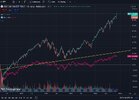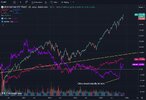Dona Ferentes
Critical Theory is an illness
- Joined
- 11 January 2016
- Posts
- 17,127
- Reactions
- 23,395
where de AUD goin'?Any reason why AUS investors shouldn't get out of ASX and into US stocks?
hint
where de AUD goin'?Any reason why AUS investors shouldn't get out of ASX and into US stocks?
You've been following me over in the inflation thread, right?Any reason why AUS investors shouldn't get out of ASX and into US stocks?


The more I think about the effects of a Trump presidency, the more pessimistic I get about the future of world economies.
The mass deportation of immigrants providing cheap labour and raising tariffs must both increase inflation in the US.
China will surely target vulnerable US industries in a trade war and, like last time, Trump will provide subsidies to US producers who are hurt.
Because he likes to be popular, he'll also provide handouts to ease the cost of living.
With control of congress and the senate, he'll massively expand the US debt to pay for all this. This might keep him looking good during his term of office, but it has to all come crashing down at some point.
Then there is putting Musk in charge of the Department of Government Efficiency. Based on what he did at X, there'll be drastic cuts in government employment and services. Regulations will also be greatly reduced, probably more than is good, and services privatised. We've seen in Australia the effects of excessive deregulation and privatisation in areas like construction, energy and toll roads.
The negative effects of some of these cuts and changes might be felt quite quickly. I wouldn't be surprised if Trump sacks Musk before the end of his term.
The more I think about the effects of a Trump presidency, the more pessimistic I get about the future of world economies.
The mass deportation of immigrants providing cheap labour and raising tariffs must both increase inflation in the US.
China will surely target vulnerable US industries in a trade war and, like last time, Trump will provide subsidies to US producers who are hurt.
Because he likes to be popular, he'll also provide handouts to ease the cost of living.
With control of congress and the senate, he'll massively expand the US debt to pay for all this. This might keep him looking good during his term of office, but it has to all come crashing down at some point.
Then there is putting Musk in charge of the Department of Government Efficiency. Based on what he did at X, there'll be drastic cuts in government employment and services. Regulations will also be greatly reduced, probably more than is good, and services privatised. We've seen in Australia the effects of excessive deregulation and privatisation in areas like construction, energy and toll roads.
They seem to quite like each other. I again wonder if trump will have learned a bit from his first term and be more collaborative/democratic than autocratic this time around.The negative effects of some of these cuts and changes might be felt quite quickly. I wouldn't be surprised if Trump sacks Musk before the end of his term.
Spot on and well put 9k.Powell now making some much "less dovish" comments and markets are taking a corresponding tumble.
He's effectively confirming that he thinks trump's policies will be more inflationary (will require rates to be higher for longer) but we already knew that on account of the fact that trump's more anti-globalisation than harris was, markets are just responding to powell de facto confirming it.
Nothing surprising at all.
not quite correct ( to my way of thinking )China will surely target vulnerable US industries in a trade war and, like last time,
I haven't shorted anything for a long time, but also looking for candidates.I wonder if shorting things like visa or Mastercard is a safe bet. Might look at meta as well. Things look toppy.
hmmm ...Pretty much anything in china. I'm just seeing a big baidu earnings miss coming across my feed now for example.
Hello and welcome to Aussie Stock Forums!
To gain full access you must register. Registration is free and takes only a few seconds to complete.
Already a member? Log in here.